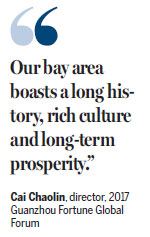Guangzhou is inviting innovators

An unforgettable experience is guaranteed - that is the pledge Guangzhou made to everyone who takes part in the Fortune Global Forum there this December.
The global forum, which is held by Fortune magazine each year, picked Guangzhou as its venue for 2017. A group of more than 60 delegates including 36 entrepreneurs from Guangzhou came to Silicon Valley to invite company executives, business partners and experts in all trades to join the event.
They pointed out how much the two areas have in common. Silicon Valley has been envied around the world for its growing collection of talent and capital, while Guangzhou, along with its home region of the Pearl River Delta, displays China's success with openness and entrepreneurship.

The delegation was headed by Cai Chaolin, director of 2017 Guangzhou Fortune Global Forum executive committee. The team made Silicon Valley the final stop on its 13-stop road show promoting the Guangzhou forum.
"Guangzhou is still not as well-known as Beijing and Shanghai," Cai told China Daily. "We are broadcasting Guangzhou's voice and it has been a very productive and rewarding trip."
Known as China's southern city, Guangzhou has prospered for centuries through commercial trade with domestic and overseas markets. It has also made tremendous progress in developing technology and innovation. And, Cai pointed out, there is a lot of catching up to do.
The municipal government will increase the share of research and development in total GDP to 3.5 percent by 2020. Investment in the technology sector grew from $836 million in 2013 to $1.67 billion in 2017.
Cai noted that there are more than one bay-area economies in the world, and the Guangdong-Hong Kong-Macau bay area has its unique qualities.
"Our bay area boasts a long history, rich culture and long-term prosperity," he said.
Compared with newcomer Silicon Valley, Guangzhou, known throughout history as Canton, started in 214 BC. It has been one of the major engines of the world's second-largest economy for 28 consecutive years, with a 2016 GDP of $284 billion.
(China Daily USA 09/22/2017 page2)
MOST POPULAR
- 1 China to give visa-free treatment to another 9 countries
- 2 China fully opens manufacturing sector to foreign investors in landmark opening up move
- 3 China's import expo attracts record-breaking participating countries, exhibitors
- 4 China's door opening even wider to foreign visitors, businesses
- 5 China revises rules to ease foreign strategic investment in listed firms
Editors' Picks
 Video:
Peru sees new port open
Video:
Peru sees new port open
 Infographic:
China's public holidays for 2025
Infographic:
China's public holidays for 2025
 Infographic:
Basic facts of APEC
Infographic:
Basic facts of APEC
 Infographic:
Wrapping up the 7th CIIE: Data recap
Infographic:
Wrapping up the 7th CIIE: Data recap



